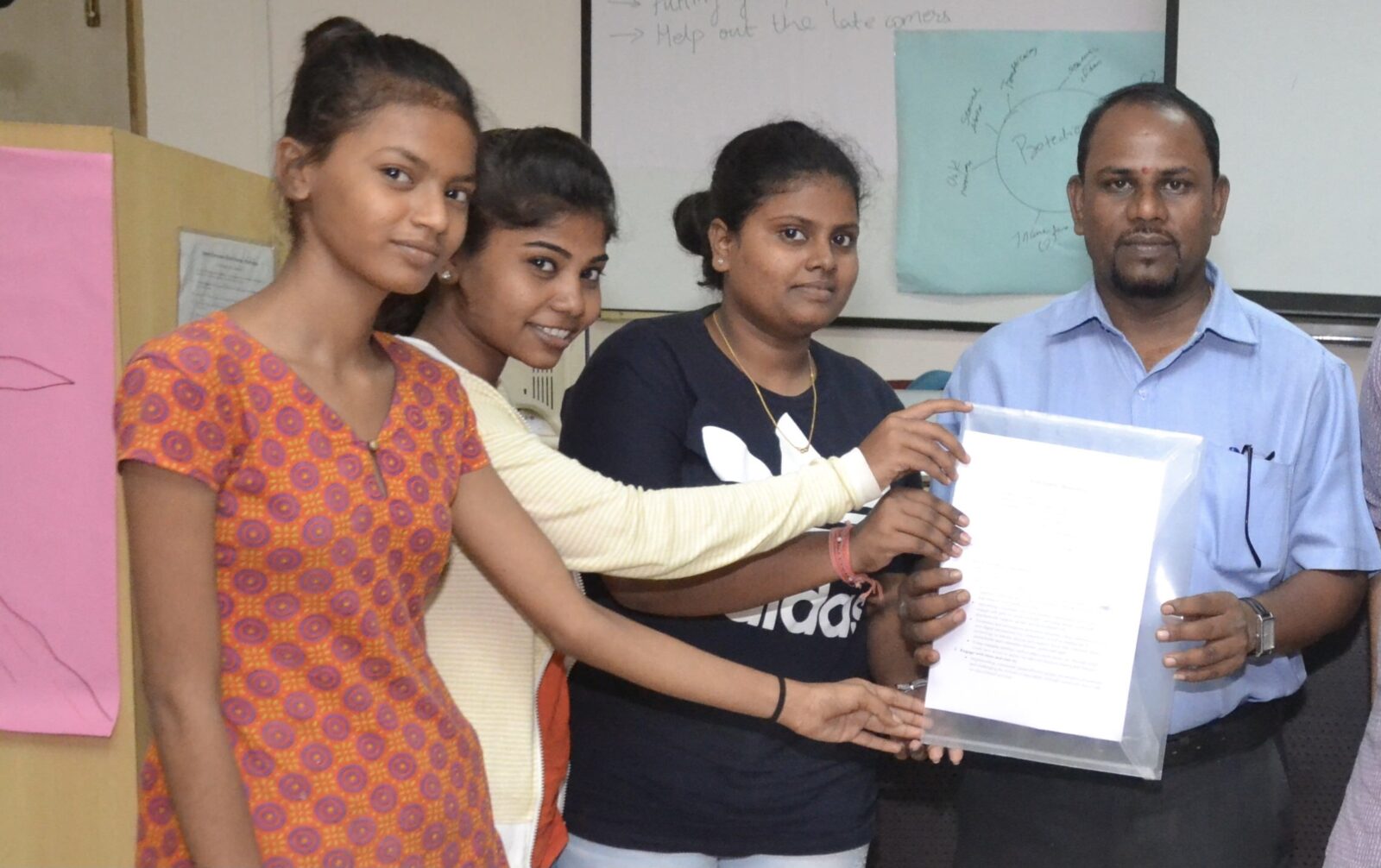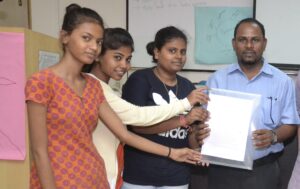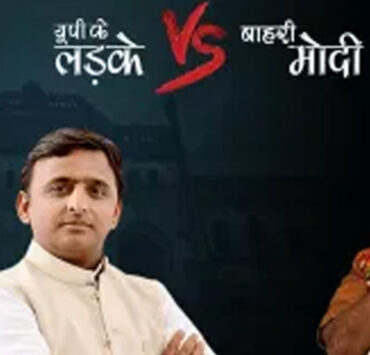
By Nandita Shah and Sakhi Nitin Anita

Inspired by the Movie “Suffrage” which showed women’s struggle to get the basic right to vote in UK, young women in Mumbai have come together with a list of demands for candidates of Municipal Elections to be held in Mumbai in February.
The Girls’ Charter of Demands, 2017
We, the girls and young women of Greater Mumbai, demand that the government of Mumbai city enable our following rights:
Right to safe and free mobility and freedom from violence
· Increase the number of lady police officers on the street as well as in all police stations.
· Public transportation services to be accessible to ALL girls and women, with special focus on disabled girls’ accessibility.
· Adequate signage, and street lighting in small lanes.
· More publicity regarding toll free help-lines and mobile phone apps that can reach girls and young women in crisis.
· More trains and extra compartments for girls and women.
· Clean and cold water filters at all local train stations.
· Functioning and clean toilets for women at all railway stations.
· Buses specifically for girls and women during peak hours: 8 A.M. to 11 A.M. and 5:00 P.M onward.
· Responsive safety apps maintained by the Mumbai police to report harassment and mark unsafe spots in the city.
· Women conductors in BEST buses.
· Creation of contiguous spaces for walking and pedestrian routes in different parts of the city,
(near stations, through slums etc.) with mixed use shops and hawkers to ensure girls’ and women’s safety.
· Dedicated night shelters for girls and women at major transport hubs such as interstate bus stops and railway stations.
· More free wifi zones in city.
· Mumbai police’s cyber crime cell to be more sensitive and responsive to women and girls’ complaints of online harassment.
Right to hygiene, health, and well-being
– Sanitary napkin/tampon dispensers in girls toilets in schools, colleges, and government buildings.
· Information about sexual and reproductive health and free access to health services.
· Adequate health facilities and counselling centres with free access for girls and young women.
· Reservation and implementation of ICDS centres and child and adolescent resource centres within informal settlements to provide immunization, supplementary diet and stimulation for learning.
· Gender and sexuality education part of the school curriculum; online safety to be an integral part of this module.
– More number of free public toilets and bathrooms for women and girls.
· Education about garbage disposal and segregation of waste in schools and colleges.
Right to safe spaces to learn and grow
– Functioning anti-sexual harassment cell in schools.
· Free self- defense workshops for girls in communities, schools and college.
· All girls should have the right to secure and decent housing.
· Dedicated hostels for young women and girls. Focus on migrant girls, girls and young women working in the unorganised sector.
· Provision of dedicated shelter homes for destitute girls, homeless girls, transgendered
persons living on the streets.
· Dedicated centres for gaining life-skills for girls and young women.
· More free or subsidized vocational courses and skill development courses for girls to enable
their livelihoods. Focus on non-traditional skills for gaining employment.
· Provision of centres for vocational training, opportunities for self employment, employment exchanges and information centres in every ward.
· Creative and safe spaces for girls to share, express themselves and dialogue with other girls
· All BMC schools to have a dedicated after school program for studying and recreation.
· Girls get equal access to community playgrounds and street libraries and reading corners.
· Complaint boxes in communities, at railway stations specifically for girls – to be operated by Special Cell.
Functioning anti-sexual harassment cell in schools.
· Free self- defense workshops for girls in communities, schools and college.
· All girls should have the right to secure and decent housing.
· Dedicated hostels for young women and girls. Focus on migrant girls, girls and young women
working in the unorganized sector.
· Provision of dedicated shelter homes for destitute girls, homeless girls, transgendered
persons living on the streets.
· Dedicated centres for gaining life-skills for girls and young women.
· More free or subsidized vocational courses and skill development courses for girls to enable
their livelihoods. Focus on non-traditional skills for gaining employment.
· Provision of centres for vocational training, opportunities for self employment, employment
exchanges and information centres in every ward.
· Creative and safe spaces for girls to share, express themselves and dialogue with other girls
· All BMC schools to have a dedicated after school program for studying and recreation.
· Girls get equal access to community playgrounds and street libraries and reading corners.
· Complaint boxes in communities, at railway stations speci?ically for girls – to be operated by Special Cell.
Functioning anti-sexual harassment cell in schools.
· Free self- defense workshops for girls in communities, schools and college.
· All girls should have the right to secure and decent housing.
· Dedicated hostels for young women and girls. Focus on migrant girls, girls and young women
working in the unorganized sector.
· Provision of dedicated shelter homes for destitute girls, homeless girls, transgendered
persons living on the streets.
· Dedicated centres for gaining life-skills for girls and young women.
· More free or subsidized vocational courses and skill development courses for girls to enable
their livelihoods. Focus on non-traditional skills for gaining employment.
· Provision of centres for vocational training, opportunities for self employment, employment
exchanges and information centres in every ward.
· Creative and safe spaces for girls to share, express themselves and dialogue with other girls
· All BMC schools to have a dedicated after school program for studying and recreation.
· Girls get equal access to community playgrounds and street libraries and reading corners.
· Complaint boxes in communities, at railway stations specifically for girls – to be operated by Special Cell.
· All policy documents should contain the word ‘girls’ along with ‘women’.
· Girl representatives should be involved in policy-making forums.
· 10% reservation of funds in the MCGM’s annual budget for girl-speci?ic policies and schemes.
· 21 years should be made the minimum age for marriage for girls and boys.
· Create spaces for dialogue with boys and men to promote gender equality.
· More public service campaigns and advertising focused on gender equality.
· Mumbai city to be made disabled-friendly and barrier-free. Special budget allocation to be made for this.
· No restrictions or girls during menstruation – PSAs to create awareness and break taboos surrounding menstruation and religious fasting.
· Open access to all religious places for girls and women.
· All policy documents should contain the word ‘girls’ along with ‘women’.
· Girl representatives should be involved in policy-making forums.
· 10% reservation of funds in the MCGM’s annual budget for girl-speci?ic policies and schemes.
· 21 years should be made the minimum age for marriage for girls and boys.
· Create spaces for dialogue with boys and men to promote gender equality.
· More public service campaigns and advertising focused on gender equality.
· Mumbai city to be made disabled-friendly and barrier-free. Special budget allocation to be made for this.
· No restrictions or girls during menstruation – PSAs to create awareness and break taboos surrounding menstruation and religious fasting.
· Open access to all religious places for girls and women.
· All policy documents should contain the word ‘girls’ along with ‘women’.
· Girl representatives should be involved in policy-making forums.
· 10% reservation of funds in the MCGM’s annual budget for girl-specific policies and schemes.
· 21 years should be made the minimum age for marriage for girls and boys.
· Create spaces for dialogue with boys and men to promote gender equality.
· More public service campaigns and advertising focused on gender equality.
· Mumbai city to be made disabled-friendly and barrier-free. Special budget allocation to be made for this.
· No restrictions or girls during menstruation – PSAs to create awareness and break taboos surrounding menstruation and religious fasting.
· Open access to all religious places for girls and women.
The Girls’ Charter of Demands 2017 is a charter made by the girls and young women of Mumbai. These demands address the candidates who are contesting the Mumbai Municipal Corporation’s election in the coming months. The girls and young women have created this charter with a view to get pledges from the electoral candidates to ful?ill the demands enlisted below to be included in their manifestos and undertake them if they acquire a seat in the Municipal Corporation.
The demands encapsulate the vision of ‘girl friendly cities’. This vision ensures that city governments consistently make decisions in the best interests of girls and young women and that the city is a place where their right to a healthy, caring, protective, educative, stimulating, non-discriminatory, inclusive, and enabling environment is fulfilled.




